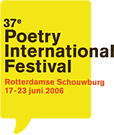Poet
|
Jan Lauwereyns 1969-... country: Belgium language: Dutch |
is one of today’s leading young Flemish poets. In his collections Nagelaten sonnetten (Posthumous Sonnets, 1999), Blanke verzen (Blank Verse, 2001), and Buigzaamheden (Flexibilities, 2002), he uses widely different forms, ranging from scintillating miniatures to lengthy narrative poems, strikingly original in tone and subject matter. Nagelaten sonnetten (1999); Blanke verzen (2001); Buigzaamheden (2002). Jan Lauwereyns(1969) has been active on the poetic front for a relatively short time, yet already he has made quite a name for himself. This is due in large part to the rather unusual combination of his poetry and his professional occupation. Lauwereyns is a neurobiologist, and traces of this can be found his poems. One could even read them as lyrical essays. Take, for instance, the cycle ‘Biologie van de dichterlijke ziel’ (Biology of the poetic soul) in his second collection Blanke verzen (Blank Verse, 2001) in which he tries to uncover the anatomy of the poetic soul. It resides, he concludes, in the eye movement inside the brain. A far cry, it seems, from time-honoured notions of divine inspiration: ‘The poetic soul was often / staring at nothing, / focusing on / a blank point in space, / at precisely those moments when / it seemed to be / thinking hardest.’ Lauwereyns’ analytical approach of poetic subjects produces a remarkable effect. This is true for the poems he writes about scientific experiments on animals, but also for scenes from his private life. The monkey that is experimented upon, receives the same poetic treatment as the poet’s own daughter. The effect is funny, incisive and unsettling all at once. It is a poetry of crackling brain cells. Lauwereyns not only experiments with the content of his poems, but with their form as well. His first collection, which was nominated for the Buddingh’ Prize, is entitled Nagelaten sonnetten (Posthumous Sonnets, 1999), but there are no sonnets in it. One wonders if the Dutch ‘nagelaten’ , which may also mean omitted, should not be taken to mean just that. The light-hearted tone of Lauwereyns’ verse frequently hides some snag. A cycle like ‘De geest van het experiment’ (The Spirit of the Experiment) from his most recent collection Buigzaamheden (Flexibilities, 2002), objectively describes a scientific experiment, yet the very absence of emotion in the description does things to the reader. This is what characterizes Lauwereyns’ unusual poetry: cool as it may seem at times, it has a way with our emotions. Author: Rob Schouten Translated by Ko Kooman Poets: |


